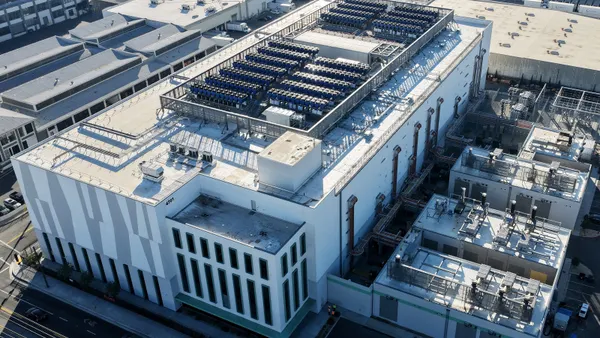Dive Brief:
- New York lawmakers are considering four different legislative proposals to help grow the state's electric vehicle (EV) market, including green jobs (S3405/A2083) and transportation (S3535/A3090) packages that would require all transit agencies in the state to transition their fleets to electric and incentivize manufacturing jobs in the sector.
- The third measure would require utilities to propose commercial tariffs for fast charging in an effort to help fleet operators go electric. The proposal, S3929/A3876, is opposed by New York's largest utility, however. Consolidated Edison calls it "too prescriptive" and warns it "would unfairly shift costs."
- The fourth measure, S1763/A4614, would allow EV manufacturers to sell cars directly to customers at New York retail locations rather than through franchise dealerships. According to Tesla East Coast Lead of Public Policy and Business Development Albert Gore, the law would lift a statewide cap certifying only five retail locations to sell EVs.
Dive Insight:
New York had limited direct sales of EVs for years, and a 2014 law constrains Tesla to just five retail stores. Doing away with direct sale limitations would be a boost to all EV manufacturers, said Gore, and could help New York address its lagging sales.
"New York is a severely underserved market for Tesla and these new manufacturers," said Gore. Specifically, he pointed to all-electric automakers Rivian and Lucid Motors as also potentially benefiting from a change in the states' vehicle sales laws.
"We've got more demand than we can serve in New York state," he said, speaking Thursday at a legislative webinar held by New Yorkers for Clean Power (NYCP). New companies are "completely blocked" from setting up retail locations while Tesla has just a handful of stores, he said.
The direct sales prohibition "is out of step with all of the progress New York state has made" on clean energy policy, said Gore. New York is targeting 2 million EVs on the road by 2030, but the state is only about 3% of the way there, he said.
The state's 2019 Climate Leadership and Community Protection Act, however, means there are significant investments in charging infrastructure being made, which in turn is boosting demand for EVs in the state, he said.
Electric automakers prefer using a direct sales model to overcome barriers to EV sales, said Gore. For a typical internal combustion engine, sales are typically closed the same day a customer comes into a dealership, he said. Tesla no longer tracks the data, but Gore said for electric vehicles it used to take more than a month to close sales.
Gore pointed to Florida, which has a similar population size but has "none of the supportive policies that exist in New York." Florida lacks a zero emissions sales mandate and EV rebates, "but it is an open market," he said, and as a result Tesla sells 65% more cars in that state.
Direct sales account for 80% of battery electric vehicles in New York and nationally, said Gore. "We hope that goes down," he said, as more traditional automakers enter the electric market.
Other legislation is vital as well, said NYCP Director Betta Broad, to "expedite the electrification of New York's transportation sector." It is the state's largest contributor to greenhouse gas emissions. The legislation to reform vehicle charging rates would make it easier for New York fleet operators to go electric.
"Tariff reform is critical to fleet electrification," said Carine Dumit, director of market development and public policy at EVgo, said at the same NYCP event.
The proposed commercial tariff bills (S.3929/A3876) would require utilities to develop and submit to the Public Service Commission alternatives to traditional commercial demand-based rate structures, said Dumit, and would require consideration for the full range of electric vehicle classes.
Con Edison supports electric transportation and has programs to encourage adoption, said spokesman Allan Drury. The proposed tariff reform law, however, does not have the utility's support.
"We believe this legislation, in its current form, is too prescriptive and would unfairly shift costs from charging companies to other customers, including those who struggle to pay their bills," Drury said in an email.
The number of struggling customers "has grown dramatically due to the pandemic and economic downturn," said Drury. "While Con Edison supports incentives to EV charging companies to reduce their operating costs, we believe this legislation should be amended to protect all Con Edison customers from an inequitable cost shift."
The utility is working with legislators on the issue, said Drury.
Fleet conversions play a major role in the green transit and jobs bills, also. Those proposals would tackle unemployment and climate change through government procurement processes, said Rachel Patterson, legislative and climate associate at Environmental Advocates of New York.
The transit bill would require public transit authorities by 2029 to purchase only new zero-emission buses as they replace their fleets. The jobs proposal would require public transportation systems eligible for public funds to use a “best value” framework when evaluating the purchase of electric buses, which would give credit to bidders who provide good wages, benefits and safety training.
"While it is true now that electric buses are a bit more expensive ... as the technology improves and agencies continue to purchase them, the price continues to drop and we do expect to see cost parity sometime in the very near future," said Patterson.













